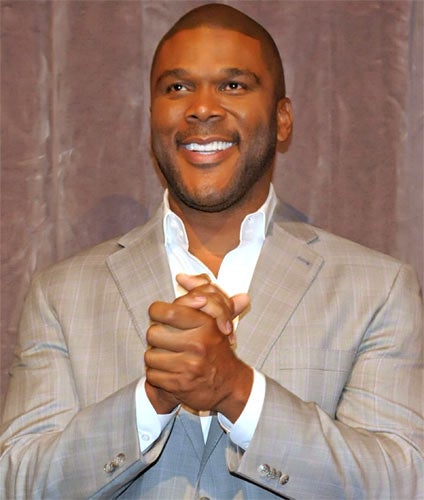The man who gave black America what it actually wanted

Fame can be a fickle mistress. Sometimes, it's downright baffling. How else can Hollywood explain the fact that its most valuable human commodity is currently an actor and film-maker of whom most of the world have never even heard?
His name is Tyler Perry, although outside of a relatively small, but fiercely loyal demographic of black America, he's more frequently referred to as "Tyler Who?"
In public, he passes unnoticed. Unless, that is, he just happens to be carrying a handbag and wearing a floral dress, which is the size of a small marquee.
This disguise, completed by a wig, latex fat suit and a layer of somewhat vampish make-up, transforms Perry, right, who turns 42 today, into a 70-something woman called Madea.
And she is at the centre of an empire which straddles the worlds of film, TV, publishing and theatre like a Colossus, measuring its value in the billions of dollars.
When Forbes magazine published its annual list of the highest-paid men in entertainment yesterday, Perry's name registered triumphantly in first place. He beat such luminaries as Steven Spielberg (3rd) Elton John (5th) and Simon Cowell (6th). Leonardo DiCaprio, the world's next-most-lucrative actor, came in at eighth. Perry's earnings, in the past year, are put at $130m (£82m). If you're still wondering who Tyler Perry is and how he does it, consider this: Perry's female-skewing casts are drawn almost entirely from the black community. Since Hollywood is run largely by white men, this gives his films a unique appeal: they speak to a hungry audience which tends to be ignored. Critics may turn up their noses, but Tyler Perry films consistently make more than $50m at the box office. Since they cost less than $15m to make and (due to his loyal following) need very little marketing, that leaves healthy room for profit.
Perry's origins did not seem to promise a fairy tale ending. Born Emmitt Perry Jr, he was raised in New Orleans by a heavily abusive father. Two neighbours repeatedly molested him as a child. He tried to commit suicide, twice.
"I look at people who don't really understand what that does to a child, especially a five-year-old who doesn't know what sex is," he once told Ebony magazine: "When that happens, it completely destroys your world... I was angry all the way up to my 20s."
But in 1998, Perry got his break. A play he wrote became a word of mouth hit. Soon, it was selling out theatres, 300 nights a year. His mailing list grew to a million fans.
For the next five years, he repeated the trick with new plays. Perry's first film script, Diary of a Mad Black Woman, was ignored by big studios. So in 2005, he entered a unique deal with Lionsgate: they would pay half the $5m budget and in return get to distribute the title. He would retain control of the rest of the property and take half its profits. On the opening weekend, he emailed fans, asking for support. They helped it make $22m on its opening weekend. It also sold 2.5 million copies on DVD in its first week.
Ten films have followed the same business model, with similar results.
Given his enduring anonymity, he is often described as the "antithesis" of a Hollywood superstar.
But the scale of his success makes you wonder if he is instead simply ahead of his time.
Join our commenting forum
Join thought-provoking conversations, follow other Independent readers and see their replies
Comments
Bookmark popover
Removed from bookmarks